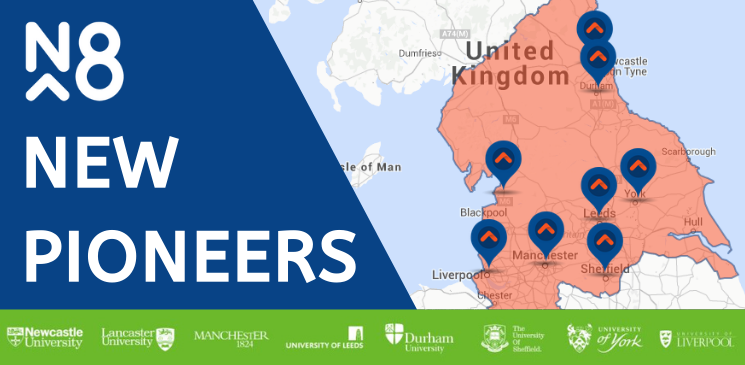
With innovation and collaboration at the forefront of our aims as a partnership, we’re kick-starting the new year with a celebration of some of our exceptional early careers researchers: ‘N8 New Pioneers’.
The N8 Research Partnership is a collaboration of the eight most research intensive universities in the North of England. Among the 19,000 academic staff across the N8, there spans a wealth of experience and expertise in areas across the physical, life and environmental sciences, engineering, social sciences, the arts and humanities and more. We’re taking a look at some of the rising stars across the N8 institutions who are working on unique and pioneering research, and creating real world impact through their work.
“Celebrating and recognising the diversity and excellent achievements of our pioneering research talent across the N8 is a fantastic way to enter 2020 as a truly innovative and collaborative partnership.
The contributions these researchers are making so early on in their careers is testament to the world class capabilities of our partner institutions and the beginning of many more powerful collaborations and impact across business, public sector and society, in the Northern Powerhouse and beyond.”
– Dr Annette Bramley, Director of the N8 Research Partnership
Read on to find out more about some of our early careers researchers across the N8 who are definitely ones to watch!
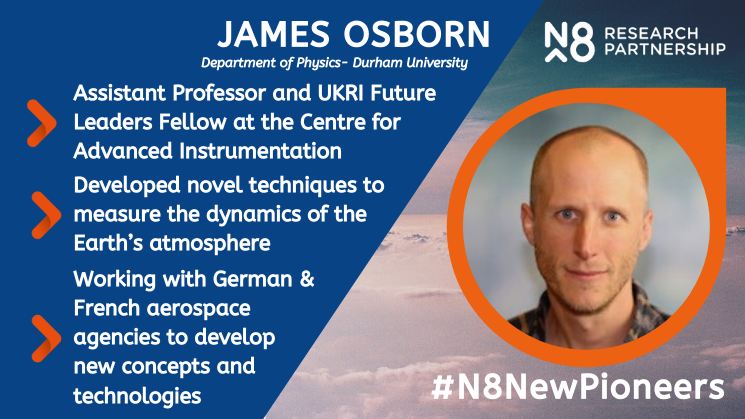
James Osborn – Department of Physics, Durham University
James Osborn is Assistant Professor and a UKRI Future Leaders Fellow at the Centre for Advanced Instrumentation. He has developed a large international network of collaborators from the Astronomical and Space Science fields, and by working at the interface of these two disciplines he has maximised the impact of his research outputs as well as facilitating the knowledge transfer between the two.
Specifically, he has developed several novel techniques to measure the dynamics of the Earth’s atmosphere and model its detrimental effects on light propagation with particular emphasis on optical astronomy and laser communications. James is also working with the German and French aerospace agencies to develop new concepts and technologies which will enable laser communications between the ground and space.
Click here to find out more about James’ research work and click here to read more about the Centre for Advanced Instrumentation at Durham University.
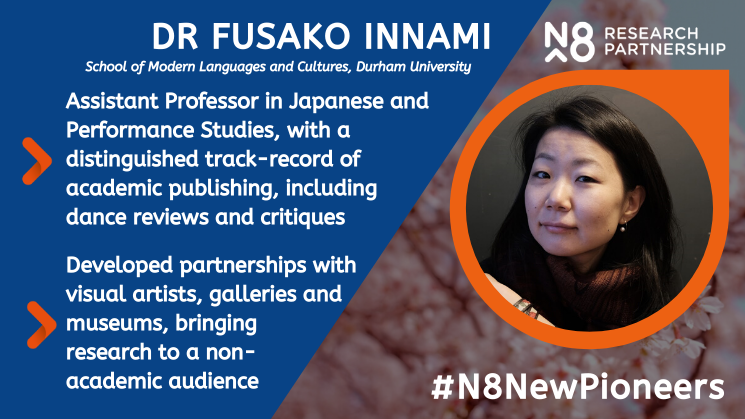
Dr Fusako Innami – School of Modern Languages and Cultures, Durham University
Fusako Innami is an Assistant Professor in Japanese and Performance Studies and the organiser and Co-convener for the School’s ‘Performance and Performativity’ research group. Alongside a distinguished record of academic publishing, her pioneering achievements in the field of the performing arts include writing dance reviews and critiques, and organising a diverse professional panel, ‘The Body, Gesture and Affect’ for major modern languages conference Our Uncommon Ground.
She has also developed partnerships with performance practitioners and visual artists, galleries and museums. A close collaboration with Glyndebourne Opera, in the context of their 2016 production of Puccini’s Madama Butterfly, has also allowed Dr Innami to bring her research to a broader non-academic audience.
Click here to find out more about Dr Innami’s many research projects and achievements.
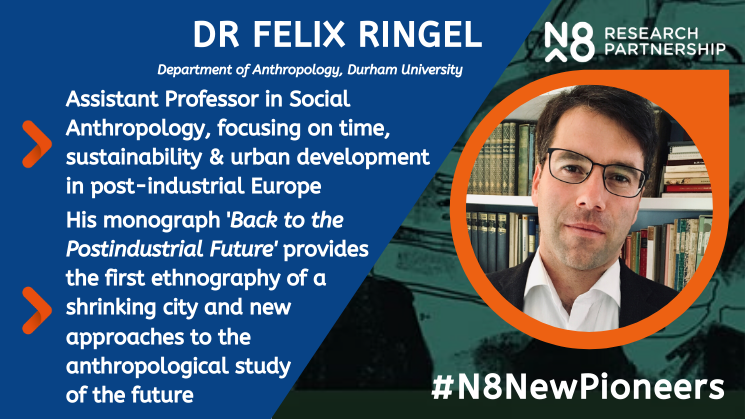
Dr Felix Ringel – Department of Anthropology, Durham University
Dr Felix Ringel is an Assistant Professor in Social Anthropology, who’s work focuses on time, sustainability and urban development in post-industrial Europe.
Dr Ringel’s monograph Back to the Postindustrial Future: An Ethnography of Germany’s Fastest Shrinking Future investigates the effects of severe population shrinkage in the German city of Hoyerswerda. Based on long-term ethnographic fieldwork, it documents how the inhabitants of a city “without a future” regain their futures, providing the first ethnography of a shrinking city and new approaches to the anthropological study of the future.
Click here to find out more about Dr Ringel’s research and publications.
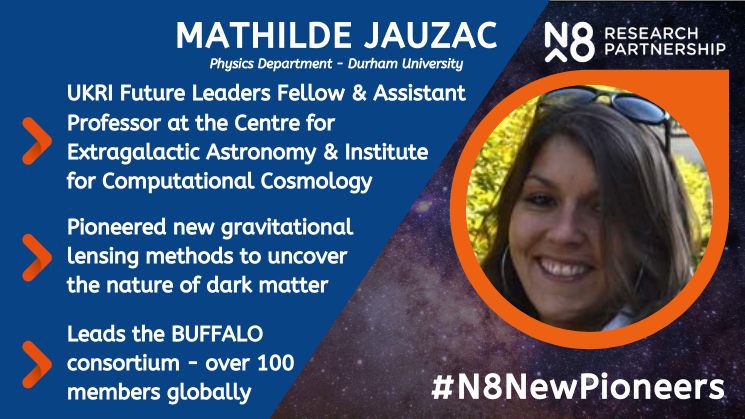
Mathilde Jauzac – Department of Physics, Durham University
Mathilde Jauzac is a UKRI Future Leaders Fellow, and Assistant Professor at the Centre for Extragalactic Astronomy & Institute for Computational Cosmology.
Mathilde has pioneered new gravitational lensing methods to uncover the nature of dark matter, one of the two biggest unknowns of our Universe. She developed a method to study the entire gravitational lensing regime, the bending of light from the mass of foreground objects, and combined this with a multi-wavelength analysis of the matter distribution in clusters in order to map dark matter – connecting observations with theory for the very first time.
Through her work on the Hubble Frontier Fields campaign Mathilde has built a strong international network and is now leading the BUFFALO consortium, which includes more than 100 members in different institutes around the globe.
Click here to read more about Mathilde’s research and click here to learn more about the Institute for Computational Cosmology.
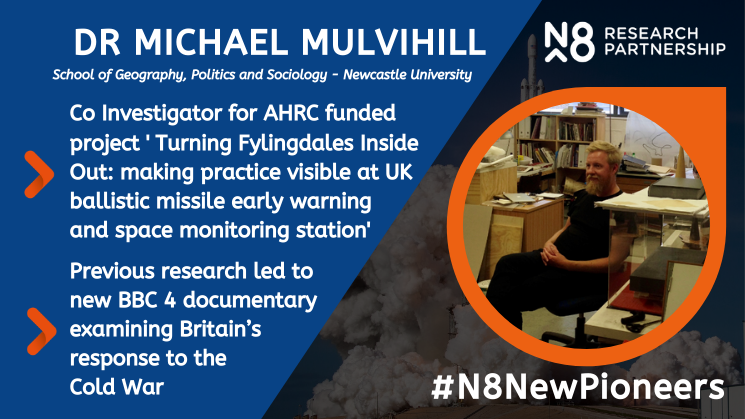
Dr Michael Mulvihill – School of Geography, Politics and Sociology, Newcastle University
Michael Mulvihill is currently Co Investigator for the AHRC-funded project ‘Turning Fylingdales Inside Out: making practice visible at the UK’s ballistic missile early warning and space monitoring station.’ 2020-2023.
Previous research by Dr Mulvihill, looks at how creative arts can investigate the effects of the nuclear deterrent on society, has also led to a new BBC Four documentary examining Britain’s response to the Cold War.
Click here to find out more about the documentary, for which Dr Mulvihill is associate producer.
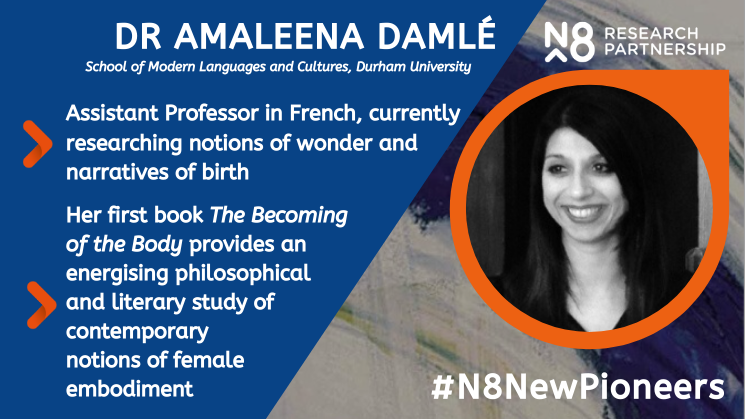
Dr Amaleena Damlé – School of Modern Languages and Cultures, Durham University
Dr Amaleena Damlé is an Assistant Professor in French, Deputy Director of Postgraduate Studies and Director of MA in Languages, Literatures and Cultures. She is currently researching notions of wonder and narratives of birth.
Her first monograph The Becoming of the Body provides a unique and energising philosophical study of contemporary women’s writing in French.
Dr Damlé is equally committed to the dissemination of research findings beyond the academy, and to working with non-academic practitioners to develop new modes of knowledge-production. She began this work in 2015, with the one-day symposium ‘Feminist Futures: Interrogating Feminist Practice into the Twenty-First Century’. The event was opened to the general public, and brought together academics, activists and artists to discuss the putative ‘fourth wave’ and the future of feminism in the academy, media, online and on the streets.
Click here to find out more about Dr Damlé’s research work and other publications.
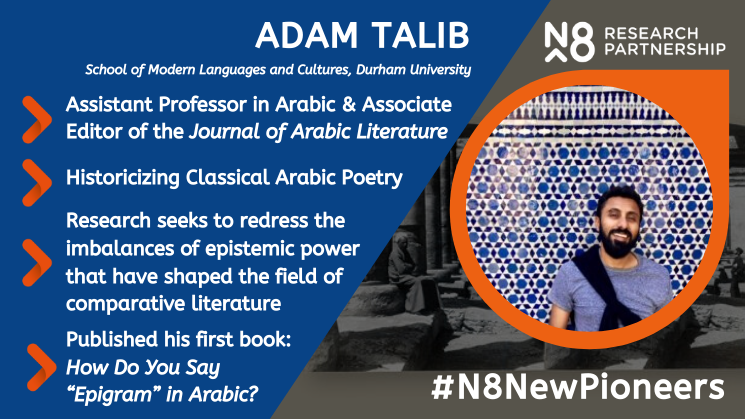
Adam Talib – School of Modern Languages and Cultures, Durham University
Adam Talib is an Assistant Professor & Director of Studies in Arabic, and Assistant Editor of the Journal of Arabic Literature, among other roles. His work demonstrates how the methods, concerns, and reading practices of comparative literature can illuminate the cultural lives of societies that were neither structured by the nation-state nor mediated by European languages.
His 2018 book How Do you Say “Epigram” in Arabic? demonstrates how extra-European literary histories can inform and radically transform both the intellectual basis of comparative literature and the landscape of world literature. He is currently at work on a second book, a study of how acts of sexual violence, coercion, and harassment are represented in pre-modern Islamicate literatures. The significance of Adam’s research is confirmed by invited lectures at numerous international universities, including Harvard, Princeton, Freie Universität Berlin and more.
Click here to find out more about Adam’s research work at Durham University.
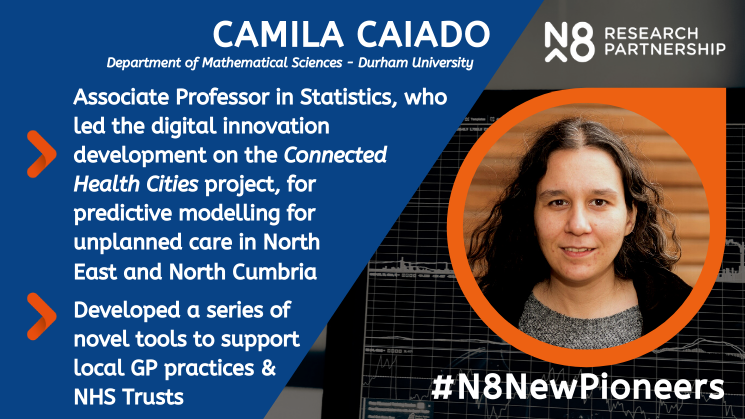
Camila Caiado – Department of Mathematical Sciences, Durham University
Camila Caiado is an Associate Professor in Statistics. Among other achievements, she led the digital innovation development in the Northern Health Science Alliance-funded Connected Health Cities project for ‘Predictive modelling for unplanned care in the North East and North Cumbria’, where the team developed a series of novel tools to support local GP practices and NHS Trusts.
This project is leading to new collaborations and has attracted support from five North East NHS trusts, two NHS England Healthy New Towns (Darlington and Bicester), local CCGs and GPs, and initiatives such as the Great North Care Record. The second phase of this project is being funded by the Academic Health Science Network, to continue the work around Early Warning Scores to help healthcare practitioners identify risk factors and dynamically predict degradation for frail patients within the hospital.
Click here to find out more about Connected Health Cities and click here to read more about Camila’s other research work and interests.
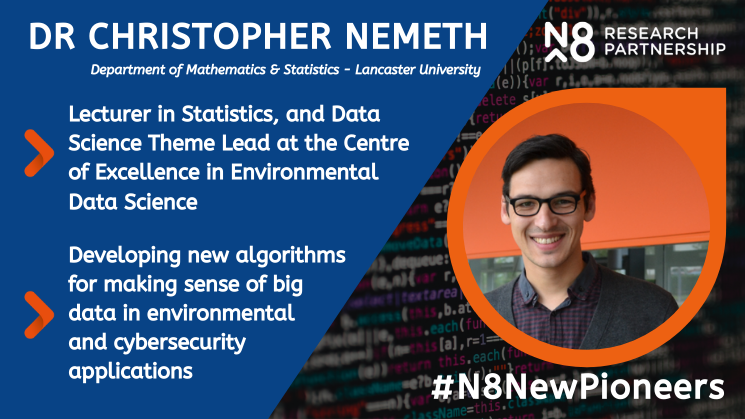
Dr Christopher Nemeth – Department of Mathematics and Statistics, Lancaster University
Dr Nemeth is a Lecturer in Statistics at Lancaster University, and Data Science Theme Lead at the Centre of Excellence in Environmental Data Science.
His research in computational statistics and statistical machine learning is developing new algorithms for making sense of big data in environmental and cybersecurity applications, and he is currently collaborating extensively with a number of climate scientists on environmental data science challenges.
Click here to find out more about Dr Nemeth’s projects and research impacts.
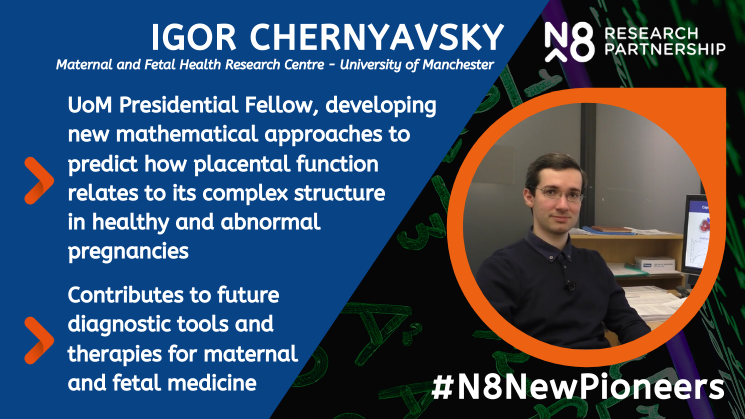
Igor Chernyavsky – Department of Mathematics; Maternal and Fetal Health Research Centre, University of Manchester
Igor Chernyavsky is a University of Manchester Presidential Fellow based in the Department of Mathematics at the University of Manchester.
His research group develops new mathematical approaches to predict how placental function relates to its complex structure in healthy and abnormal pregnancies. This work contributes to future diagnostic tools and therapies for maternal and fetal medicine.
Click here to find out more about Igor’s research project at the Maternal and Fetal Health Research Centre.
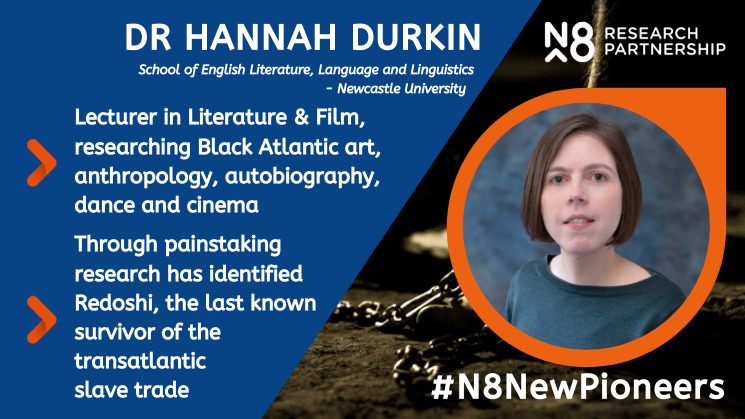
Dr Hannah Durkin – School of English Literature, Language and Linguistics, Newcastle University
Dr Durkin is a Lecturer in Literature & Film with research Interests in: Black Atlantic art, anthropology, autobiography, dance and cinema.
Painstaking research by Dr Durkin has identified Redoshi, the last known survivor of the transatlantic slave trade. The research pieces together her life – from her kidnapping in West Africa and enslavement in Alabama, to her experiences in the segregation-era U.S. South.
It also highlights her close association with the activist beginnings of the U.S. Civil Rights Movement to create an exceptionally detailed biographical portrait of a female transatlantic slavery survivor.
Click here to find out more about Dr Durkin’s work on Redoshi.
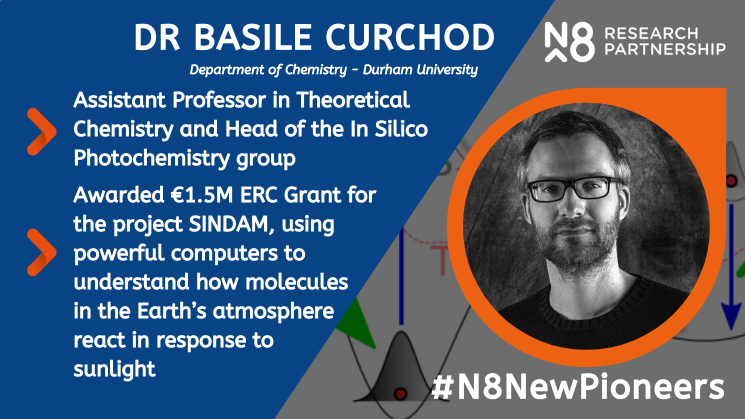
Dr Basile Curchod – Department of Chemistry, Durham University
Dr Basile Curchod is an Assistant Professor in Theoretical Chemistry and Head of the In Silico Photochemistry group. He was awarded a €1.5M ERC Starting Grant for the project SINDAM (Sunlight-Induced Nonadiabatic Dynamics of Atmospheric Molecules), focussing on the role played by sunlight on the chemical composition of our atmosphere.
With his research he aims to unravel computationally the importance of photochemical reactions in our atmosphere and their connection to air pollution.
Click here to find out more about the research work of the In Silico Photochemistry group.
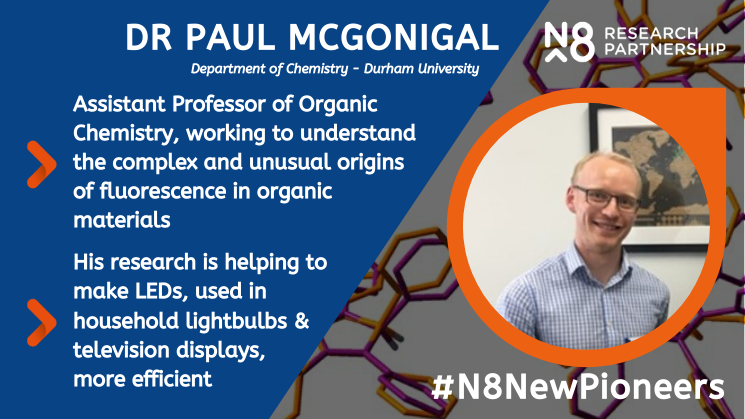
Dr Paul McGonigal – Department of Chemistry, Durham University
Dr Paul McGonigal is an Assistant Professor of Organic Chemistry, investigating new small-molecule motifs for functional materials by taking advantage of unusual interactions, reactivity, and dynamics.
Working to understand the complex and unusual origins of fluorescence in organic materials. Paul’s research is helping to make light emitting diodes (LEDs), used in household lightbulbs and television displays, more efficient.
Click here to read more about the research work of the McGonigal group at Durham University.
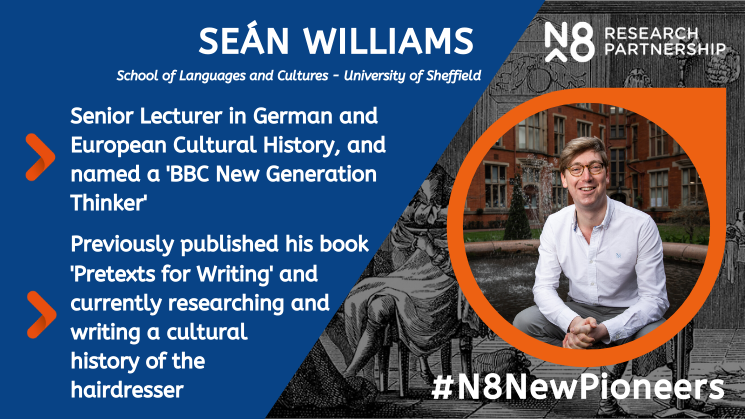
Seán Williams – School of Languages and Cultures, University of Sheffield
Seán Williams is Senior Lecturer in German and European Cultural History. His book ‘Pretexts for Writing’ is concerned with print culture around 1800, while his second book project – under contract with Reaktion Books – looks at cultural history since the eighteenth century, through the figure of the hairdresser.
His research forms an Impact Case Study, which includes significant media work with BBC Radio 3 (presenting a number of authored cultural documentaries and magazine-style formats or discussions, especially on the time around 1800), and interviews on the World Service, BBC local radio, and Swiss national radio. He has also written research-based articles and lead commentaries for The Observer, The Guardian and The Daily Telegraph, among others, and was named a BBC/AHRC New Generation Thinker in 2016.
Click here to read more about Seán’s current research and publications.
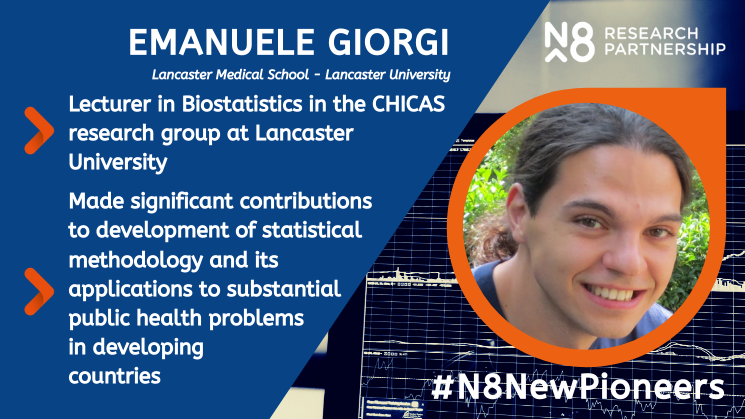
Emanuele Giorgi – Lancaster Medical School
Emanuele is a Lecturer in Biostatistics in the CHICAS research group at Lancaster University and has made significant contributions to the development of statistical methodology and its applications to substantial public health problems in developing countries.
His research has provided innovative approaches to better inform disease control programmes in Africa, with a special focus on malaria and neglected tropical diseases. The novel methodology developed by Emanuele has been especially useful to make best use of programmatic data in the identification of high and low risk areas. One of the main achievements of his work has been the development of a pioneering method for combining disease prevalence data from multiple sources which allows to account for and remove bias from non-representative surveys carried out at convenient locales, such as schools, hospitals and markets.
Click here to find out more about Emanuele and his achievements.
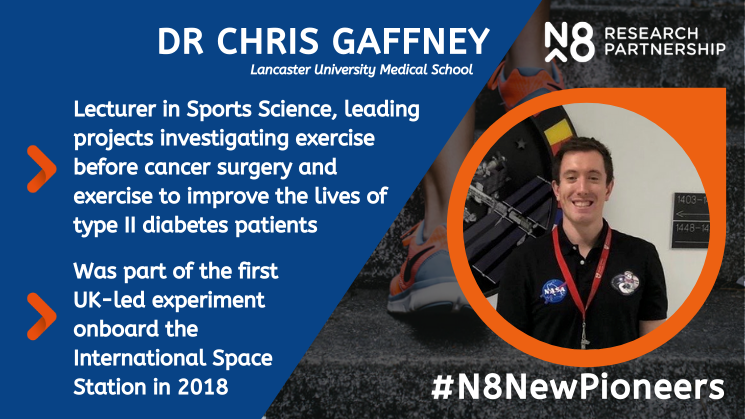
Dr Chris Gaffney – Lancaster University Medical School
Dr Chris Gaffney is a Lecturer in Sports Science, pursuing research which has direct impacts on health and wellbeing.
Chris currently leads externally funded projects investigating how exercise before cancer surgery can improve patient prognosis, and how exercise can be used to improve the lives of those living with type II diabetes. Chris was also part of the first UK-led experiment onboard the International Space Station in 2018. This project involved sending microscopic worms to space to determine the molecular mechanisms of muscle atrophy during spaceflight. By determining these mechanisms, we can design molecularly rationalised treatment strategies and effectively prepare humans for a manned mission to Mars.
Click here to find out more about Dr Gaffney’s research work.
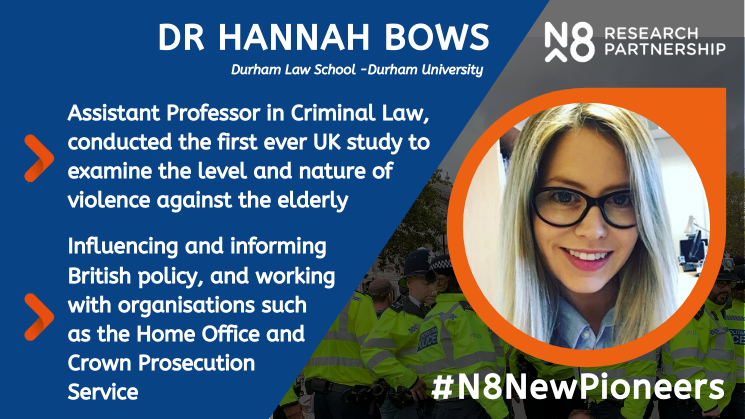
Dr Hannah Bows – Durham Law School, Durham University
Dr Hannah Bows is an Assistant Professor in Criminal Law, having previously completed her ground-breaking PhD research examining the extent, nature and consequences of sexual violence against people aged 60 and over in the UK in 2016.
She also conducted the first UK study to examine the level and nature of violence against the elderly, producing the first (and currently only) national data on these crimes. This body of work has addressed both empirical and theoretical gaps in knowledge resulting in significant impact inside and outside of the academy, influencing and informing British policy, and working with organisations such as the Home Office and Crown Prosecution Service.
Click here to find out more about Dr Bows’ research work.
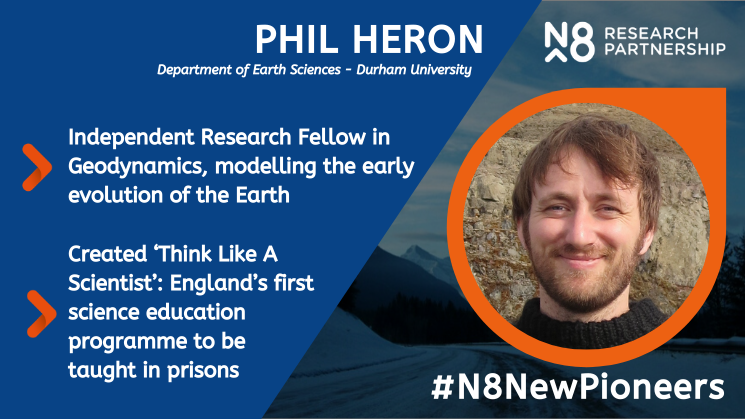
Phil Heron – Department of Earth Sciences, Durham University
Phil Heron is an Independent Research Fellow in Geodynamics, whose research models the early evolution of the Earth.
Phil created ‘Think Like A Scientist’ – England’s first science education programme to be taught in prisons. He has presented this with great success in three local prisons, with feedback showing that the programme builds confidence in education for hard-to-reach students. He has also organised a national conference on the subject and is working on developing the programme nationwide in the future.
Click here to find out more about Phil’s ‘Think Like A Scientist’ programme and click here to read more about his research work in Geodynamics.
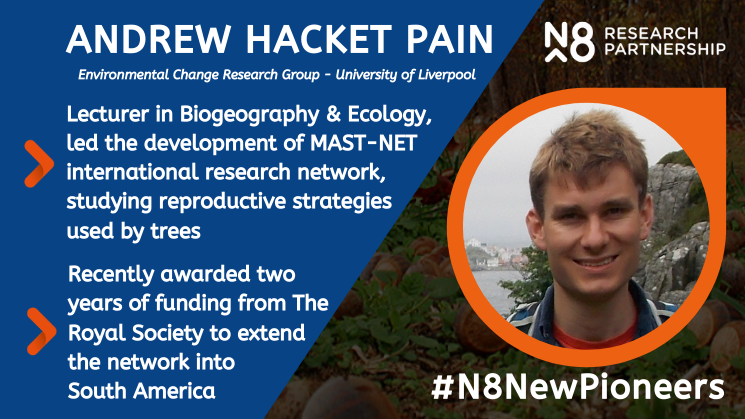
Andrew Hacket Pain – Environmental Change Research Group, University of Liverpool
Andrew Hacket-Pain is a Lecturer in Biogeography and Ecology, and has led the development of an international network of leading researchers, leading to the NERC-funded project “MAST-NET”.
In its first year, the project has produced an agenda-setting paper in Ecology Letters, the first phylogenetic analysis of the evolution of reproductive strategies across the plant tree-of-life and exciting work on the interaction of fire disturbance and pulsed seed production in boreal forests.
Through the MAST-NET project, Andrew has led a major phase of network building in a highly international research area, and he has recently been awarded two years of funding from The Royal Society to extend the network in to South America.
Click here to find out more about Andrew’s work on the MAST-NET network.
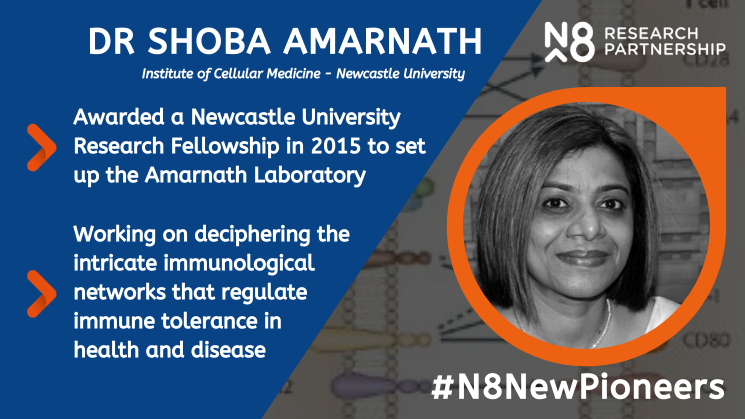
Dr Shoba Amarnath – Institute of Cellular Medicine, Newcastle University
Dr Shoba Amarnath was awarded a Newcastle University Research Fellowship in 2015 to set up a laboratory at Newcastle University.
The research vision of the Amarnath Laboratory is to decipher the intricate immunological networks that regulate immune tolerance in health and disease. Specifically, the team focus on understanding how a clinically relevant coreceptor molecule called programmed death-1 receptor (PD-1) dampens the immune response.
Click here to find out more about Dr Amarnath’s laboratory, and click here to read more about her background and research work.
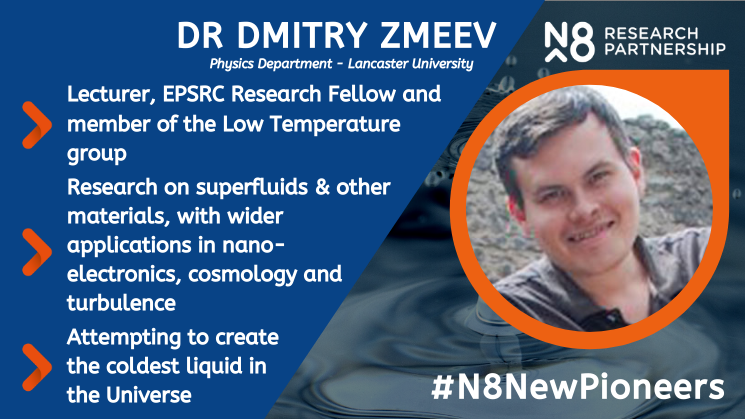
Dr Dmitry Zmeev – Physics Department, Lancaster University
Dr Dmitry Zmeev is a Lecturer and EPSRC Research Fellow awarded a £1.4M Career Fellowship over 5 years. He is a member of the Low Temperature group which has a strong international reputation for performing state-of-the-art experiments at the lowest achievable temperature on earth.
Dr Zmeev’s work includes experimenting on superfluids and other materials, with wider applications in areas such as nano-electronics, cosmology and turbulence. His research focuses on superfluid helium 3He, a liquid which does not freeze down to absolute zero, and he is attempting to create the coldest liquid in the Universe.
Click here to find out more about Dr Zmeev’s work on this and other projects.
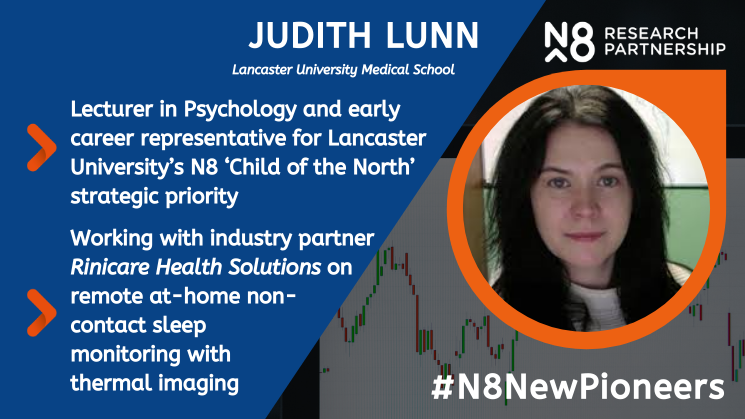
Judith Lunn – Lancaster University Medical School
Judith Lunn is a Lecturer in Psychology, and was invited to take up the role of early career representative for Lancaster University’s N8 ‘Child of the North’ strategic priority.
Her current research work focuses on the development of new techniques to monitor health and neurodevelopment in childhood and adolescence, and she was awarded an MRC Proximity to Discovery grant in 2019, currently working with industry partner Rinicare Health Solutions on remote at-home non-contact sleep monitoring with thermal imaging.
As a direct output of the N8 Research Partnership’s focus on multi-sector integration in addressing the developing child, she has also forged new collaborative partnerships with NHS, local authorities, third sector and industry partners.
Click here to find out more about Judith’s research projects and publications.
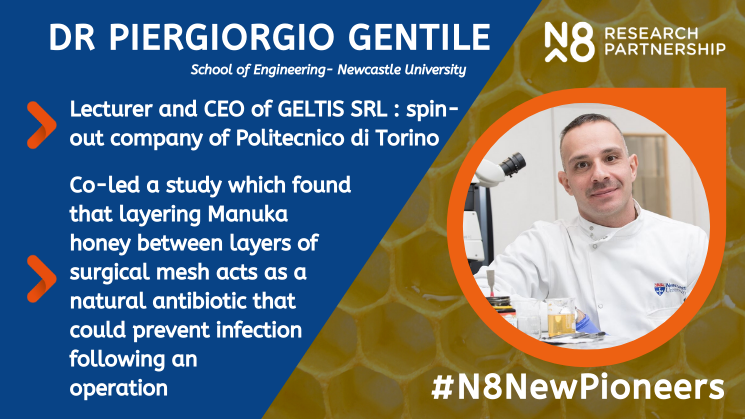
Dr Piergiorgio Gentile – School of Engineering, Newcastle University
Dr Gentile joined the School of Engineering in September 2015 as Lecturer and is also currently CEO of GELTIS SRL, a spin-out company of Politecnico di Torino involved in the synthesis of biodegradable polymers for drug delivery and tissue engineering.
Dr Gentile co-led a study at Newcastle University which found that layering minute amounts of Manuka honey between layers of surgical mesh acts as a natural antibiotic that could prevent infection following an operation.
Click here to find out more about Dr Piergiorgio’s study using Manuka honey.
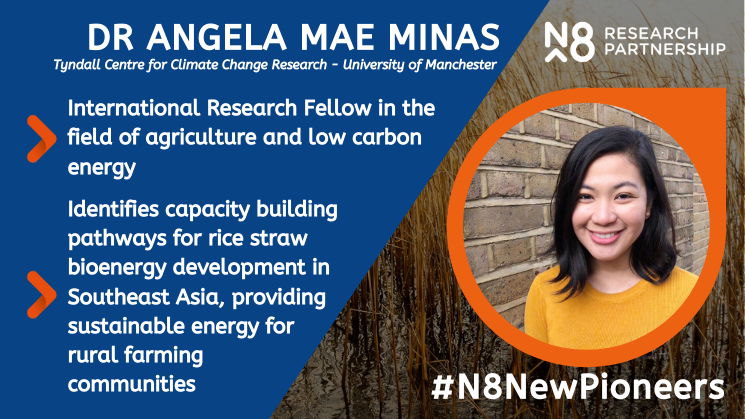
Dr Angela Mae Minas – Tyndall Centre for Climate Change Research, Department of Mechanical, Aerospace and Civil Engineering, University of Manchester
Dr Angela Mae Minas is an International Research Fellow – a social scientist in the field of agriculture and low carbon energy, with expertise in participatory methods, policy innovation and social network research.
Angela’s research work identifies capacity building pathways for rice straw bioenergy development in Southeast Asia, providing a sustainable energy source for rural farming communities. She has collaborated with international agricultural research institutions such as the International Rice Research Institute and the CGIAR Climate Change Agriculture and Food Security Programme, to increase farmer-focused research on bioenergy, reduce emissions from burning of agricultural residues, and improve rural livelihoods.
Click here to read more about the impact of Angela’s research work in this field.
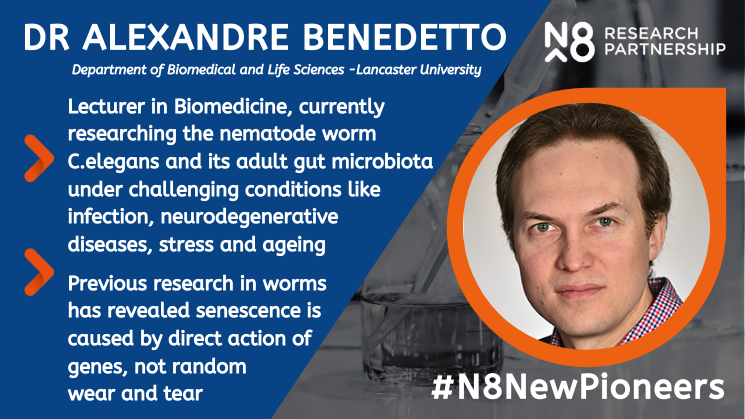
Dr Alexandre Benedetto – Department of Biomedical and Life Sciences, Lancaster University
Dr Benedetto is a Lecturer in Biomedicine at Lancaster University, currently researching how animals and their microbiome communicate throughout life to maintain homeostasis.
His previous research with UCL and QMUL has revealed that ageing in worms mainly results from the direct action of genes and not from random wear and tear or loss of function, and the same is likely to be true in humans.
Click here to find out more about Dr Benedetto’s work on this project.
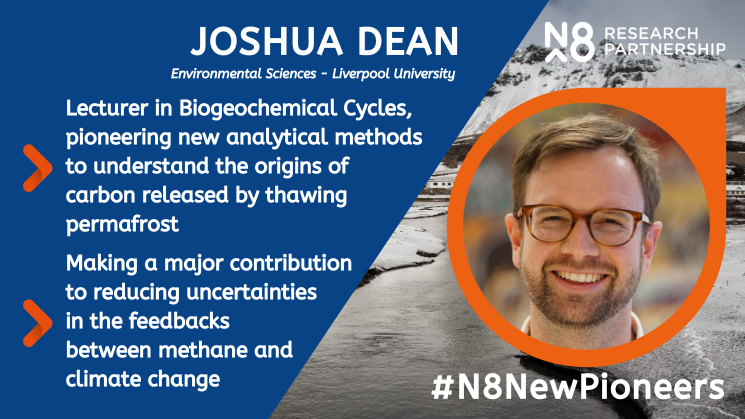
Joshua Dean – School of Environmental Sciences, University of Liverpool
Joshua Dean is a Lecturer in Biogeochemical Cycles at the University of Liverpool, while also starting to lay the foundations of his own lab in Liverpool by obtaining £50,000 worth of equipment from the Faculty of Science and Engineering.
Joshua is combining fieldwork in extreme environments with pioneering new analytical methods using natural abundance radiocarbon (14C) to understand the origins of carbon released by thawing permafrost. This work is making a major contribution to reducing uncertainties in the feedbacks between methane and climate change. He is also pioneering the application of these methods in other novel areas, including to understand energy and nutrient flows through aquatic ecosystems, and to understand how urban waterways may be a major but previously-unrecognised centre of carbon processing.
Click here to find out more about Joshua’s research work on methane and climate change.
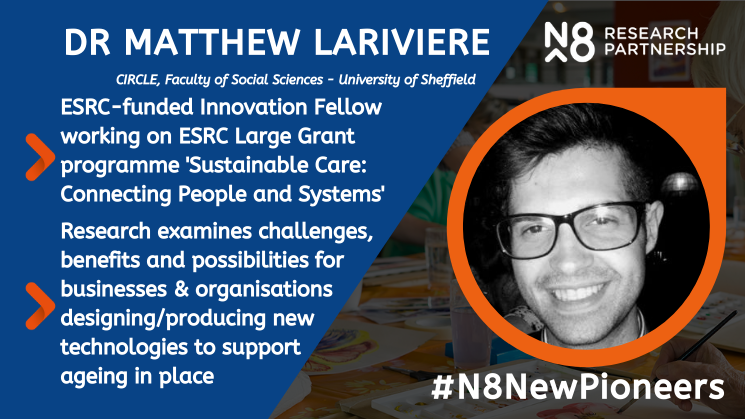
Dr Matthew Lariviere – CIRCLE, Faculty of Social Sciences, University of Sheffield
Dr Matthew Lariviere joined the University of Sheffield as an ESRC-funded Innovation Fellow linked with the ESRC Large Grant programme ‘Sustainable Care: Connecting People and Systems’.
Matthew is a social anthropologist and gerontologist interested in cross-cultural understandings and experiences of ageing and memory (loss) particularly as they intersect with care practices involving health/care technologies. He was attracted to the Sustainable Care Programme’s focus on contributing theoretically-informed and rigorous empirical research on care and wellbeing to help address the needs of policy makers, industry, and other relevant stakeholders. This focus resonated with his own values of public and stakeholder engagement – an increasingly instrumental practice for generating research impact outside of the academy. As an Innovation Fellow, Matthew’s research will examine challenges, benefits and possibilities for businesses and organisations designing and producing new technologies to support ageing in place. He will work closely with industry and non-academic partners to help them identify their needs and future potential.
Matthew was also interviewed by the Parliamentary Office of Science and Technology for their “Robotics in Social Care” POSTnote last year based on the ongoing work of his UKRI Innovation Fellowship.
Click here to find out more about Dr Lariviere’s research work at CIRCLE.
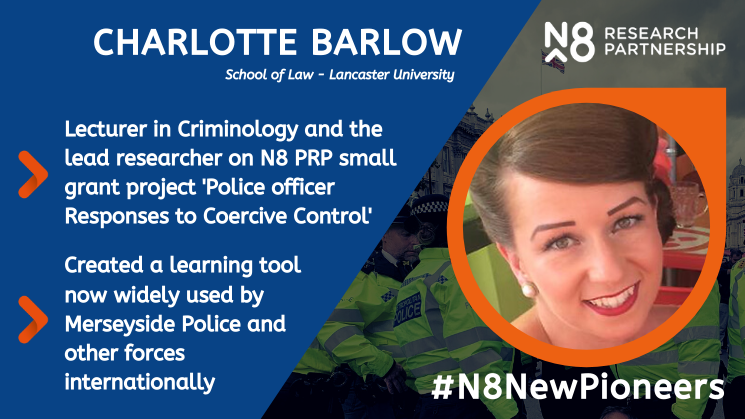
Charlotte Barlow – Lancaster University Law School
Charlotte is a Lecturer in Criminology and was also the lead researcher on an N8 PRP small grant project entitled: ‘Police Officer Responses to Coercive Control’.
This research was co-produced with Merseyside Police and other colleagues from across the N8 universities, and was the first research internationally to explore responses to coercive control, with project findings make a significant contribution to knowledge. The project produced a Learning Tool which includes audio reflections from a police officer who led the investigation of a successful prosecution for coercive control, and from survivors of coercive control. The tool also contains activities for officers to complete post-learning and has had wide application across Merseyside Police and take up in other forces and interest nationally. Charlotte has been consulted by national and international organisations about this research and project findings have influenced policy.
Click here to find out more about Charlotte’s work leading this project.
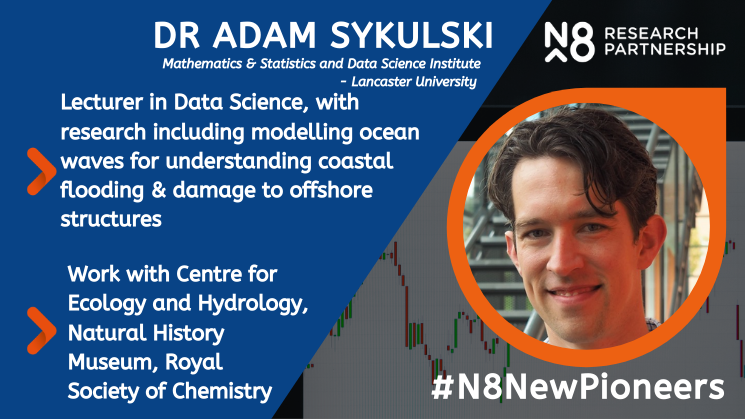
Dr Adam Sykulski – Department of Mathematics and Statistics and Data Science Institute, Lancaster University
Dr Sykulski is a Lecturer in Data Science at Lancaster University. Examples of his research projects include modelling ocean waves for understanding coastal flooding and damage to offshore structures; and modelling the spread of plastic and biological species in the ocean and how this responds to climate change.
Adam has also collaborated on environmental research with the Centre for Ecology and Hydrology and JBA Consulting, as well as outreach work running events with the Natural History Museum, Royal Society of Chemistry Lancashire Section, and summer schools with schoolchildren from Lytham St Annes in Lancashire – to help communicate research relating to climate, oceans, and data science.
Click here to find out more about Dr Sykulski’s research activities.
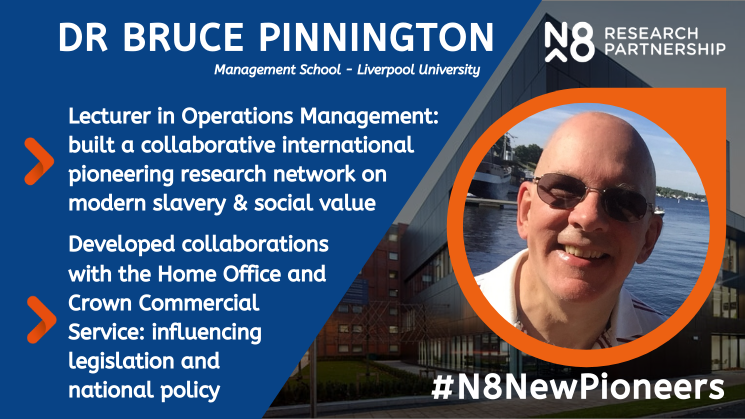
Dr Bruce Pinnington – Management School, University of Liverpool
Dr Bruce Pinnington is a Lecturer at the University of Liverpool’s Management School, having completed his PhD there in 2017.
Bruce has been successful in attracting funding to build a collaborative international research network of scholars, policy makers, business leaders and NGOs, developing pioneering research around modern slavery and social value in supply chains – providing new insight into transparency, power, and collaborative working. He has also developed formal collaborations with the UK Government’s Home Office and Crown Commercial Service, with research findings now influencing legislation and national policy.
Click here to find out more about Dr Pinnington’s research work.
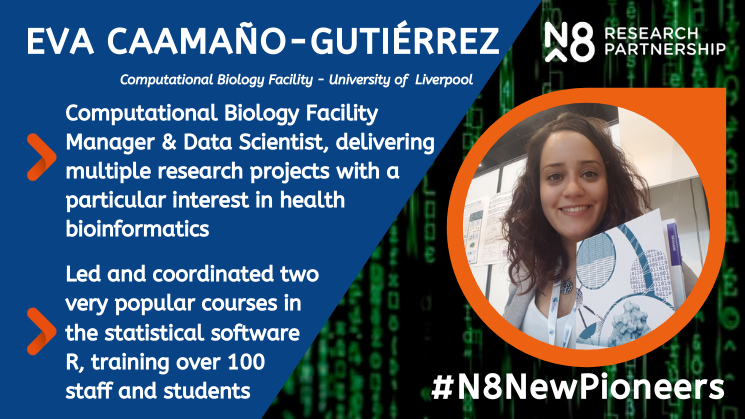
Eva Caamaño-Gutiérrez – Computational Biology Facility, University of Liverpool
Eva Caamaño-Gutiérrez is the Computational Biology Facility Manager and Data Scientist, coordinating and delivering a number of research projects with a particular interest in health bioinformatics. In the last year, addressing a need identified across N8 partners, Dr Caamaño-Gutiérrez has led and coordinated the deployment of two very popular courses in the statistical software R, training over a hundred staff and students.
Among other work, Eva has also provide research insights with medical doctors, bench scientists, mathematicians, industry representatives and funding bodies; supporting numerous research projects in key areas within the University of Liverpool’s Faculty of Health and Life Sciences, as well as organising scientific meetings to promote data science in life sciences to different audiences, from early career researchers to the wider University community.
Click here to find out more about Eva’s work and click here to read more about the Computational Biology Facility at the University of Liverpool.
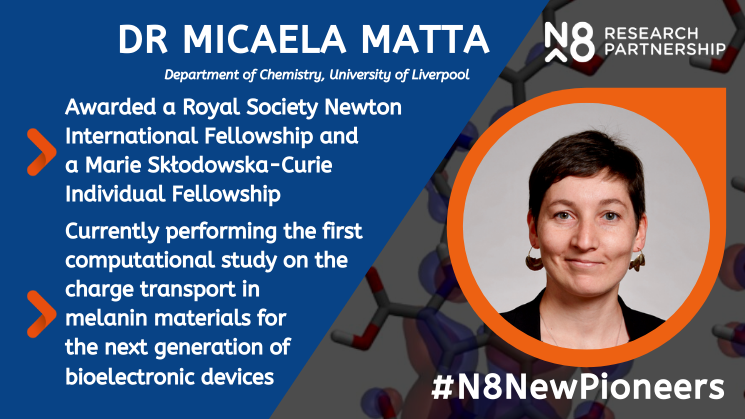
Dr Micaela Matta – Department of Chemistry, University of Liverpool
Dr Micaela Matta was awarded a Newton International Fellowship and a Marie Skłodowska-Curie Fellowship to work on molecular simulations of melanin-based materials for bioelectronics.
She is currently performing the first computational study on the charge transport in melanin materials, which will pave the way towards their application in biocompatible interfaces for nanomedicine and biosensing.
Click here to read an interview with Dr Micaela Matta and click here to read more about her current research project.
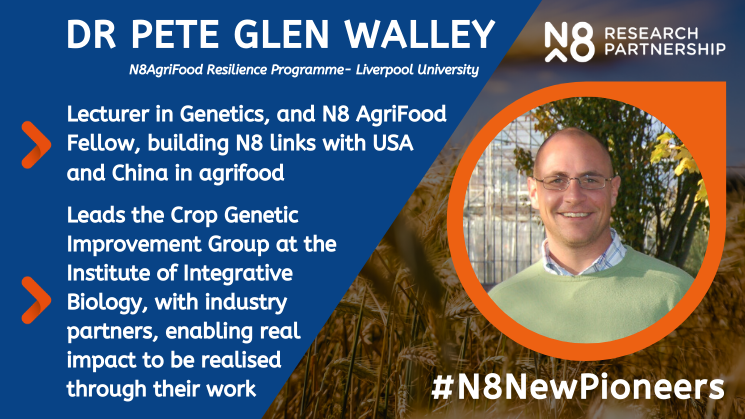
Dr Peter Glen Walley – Institute of Integrative Biology, University of Liverpool
Dr Peter Glen Walley is a Genetics Lecturer and an N8 AgriFood Fellow. He leads the Crop Genetic Improvement Group at the Institute of Integrative Biology where he and his team work on sustainable crop production with various industry partners such as New Heritage Barley Ltd, The John Innes Centre and CN Seeds Ltd, enabling real impact to be realised through their work.
Peter is also the most active Knowledge Exchange Fellow of the N8AgriFood programme, internationally, since its start in 2016. He has represented the N8 at all its missions abroad, helping to develop international partnerships for N8 AgriFood with missions to China, USA, Argentina, Spain, Brazil.
Click here to find out more about Dr Walley’s research, and click here to read more about N8 AgriFood’s international engagement.
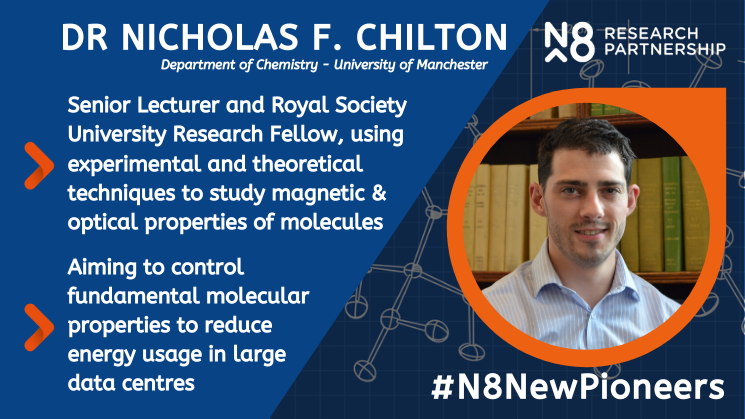
Dr Nicholas F. Chilton – Department of Chemistry, University of Manchester
Dr Chilton is a Senior Lecturer and Royal Society University Research Fellow, who is using experimental and theoretical techniques to study the magnetic and optical properties of molecules for applications in data storage, medical diagnostics and quantum computing.
His research group The Chilton Group are hoping to control fundamental molecular properties to reduce energy usage in large data centres and make scalable quantum computing possible.
Click here to find out more about the Chilton group and Dr Chilton’s research work.
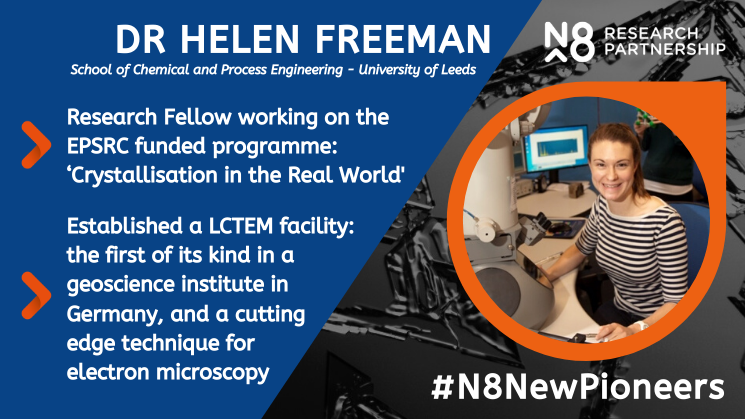
Dr Helen Freeman – School of Chemical and Process Engineering, University of Leeds
Dr Helen Freeman is a Research Fellow working on the EPSRC funded programme: ‘Crystallisation in the Real World: Delivering Control through Theory and Experiment’.
Helen’s research has a consistent theme of in-situ materials characterisation to improve sustainable engineering systems, including using advanced transmission electron microscopy (TEM) for micro/nano-structural materials characterisation, research which has contributed towards the extended lifetime of nuclear reactors.
While working at the GFZ German Research Centre for Geosciences, she personally established a LCTEM facility; the first of its kind in a geoscience institute in Germany and a cutting edge technique for electron microscopy.
Click here to find out more about Dr Freeman’s work on ‘Crystallisation in the real World’.